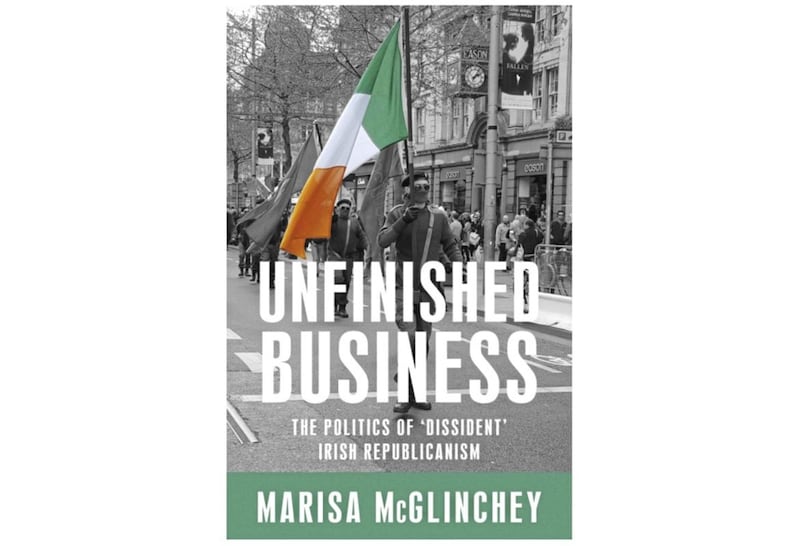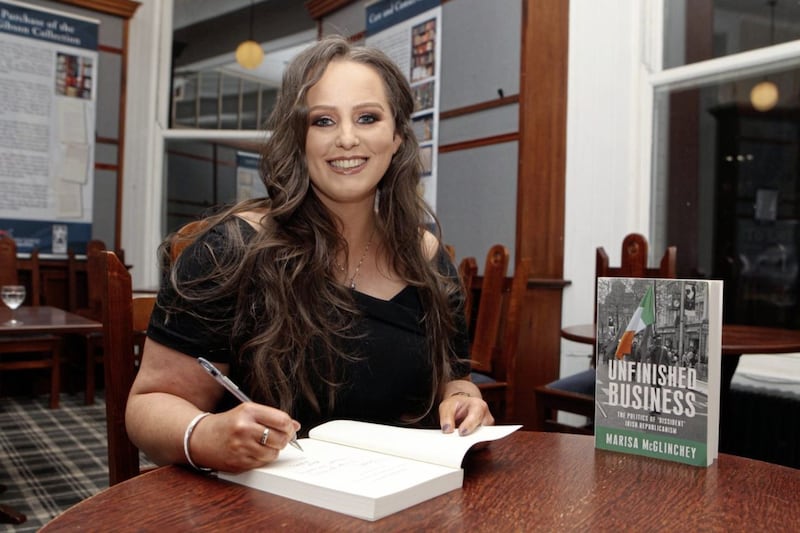WHEN Marisa McGlinchey was launching her academic book Unfinished Business: The Politics of 'Dissident' Irish Republicanism in Dublin last year, leading historian Eunan O'Halpin told those in attendance that her challenge now was to "top it".
As a holistic assessment of dissident republicanism, the west Belfast woman's first book is a fascinating read; providing an insight into the psyche of various dissident organisations and exploring the ideology of such a heterogeneous and secretive movement.
What makes McGlinchey's book all the more remarkable is that she managed to gain the trust of around 90 members of those groups, who granted her interviews for the book.
The gauntlet thrown down by O'Halpin, Marisa, a research fellow in political science at the Centre for Trust, Peace and Social Relations at Coventry University, is currently working on her second book, about the SDLP. And she admits the pressure is on.
“I genuinely didn't expect Unfinished Business to get the attention it did,” says McGlinchey. “The book launch last year coincided with activity such as the New IRA car bomb explosion at Derry courthouse and then the book was reviewed by Peter Hain. In fact, Colum Eastwood says he has recommended the book to former and current secretaries of state.
“It was my life for seven years but not all academic books are widely read so I've been taken aback by the reaction over the last year or so. The pressure is on with the next book, but I did feel huge pressure with Unfinished Business too. I wanted to get it absolutely right.”

Growing up in west Belfast, "a hotbed of political and republican activity", Marisa says it was a foregone conclusion she would develop an interest in politics. A naturally inquisitive child, she listened to the stories of her grandmother, who had fled Bombay Street and had known Tom Williams. The 36-year-old recalls seeing British soldiers lying in the garden of her home and also has memories of climbing on to a chair to look out the kitchen table as balaclava-clad men and women paraded by. What started out as mild curiosity intensified into intellectual curiosity.
“In my late teens I started to see more so-called dissident republicans around me and started to hear more republicans becoming increasingly critical of Sinn Fein,” explains McGlinchey.
“I wanted to know why; why had they turned bitterly against their former comrades and vice versa. I wanted to delve into their psyche.”
Having had familial ties to the SDLP, McGlinchey had decided her thesis would be on the mainstream nationalist party. But as a debut academic book, she had no doubt in her mind that it would be Unfinished Business.
“To be honest, it's the book I wanted to write for a long time,” she says. “I was driven to do it. I knew it would make a good book. My SDLP thesis was quite different. I was writing that as a PHD and thought it would be a good idea to get some distance from it.”
With the seed sown for her first book, McGlinchey, who prefers to use the word 'radical' over 'dissident', began to travel the length and breadth of Ireland to attend commemoration events and meet key people. Naturally, there was suspicion but over time she managed to ingrain herself in dissident circles and build up trust.
“I was going all round the country meeting people, calling into offices, visiting farms. The network snowballed. The republican world is a secretive one, full of suspicion, particularly of anyone asking questions, so it took a long time to gain their trust.
“When I wanted to do interviews with the spokesperson for an armed group, that took even longer. I really had to build that trust to gain access to prisoners in Maghaberry and Portlaoise prisons. I had 'gatekeepers' who could help with that.
“The most difficult interviews were with the armed group's spokesperson. I had to get legal advice on how to quote those interviews. At the start of every interview I conducted, whether violent or non-violent, I told them not to disclose anything of an illegal nature. That made them more comfortable doing interviews. Maybe because they were talking about their ideology and motivation, they agreed to speak to me."
The result of McGlinchey's lengthy, intensive research is the largest collection of testimonies to date from dissident republicans, ranging in age from a 19-year-old Na Fianna Éireann member in Dublin to 93-year-old Billy McKee, who died last year. McGlinchey says she wanted to move beyond the stereotypes and the better-known names and that she could've included even more testimonies, but had to "draw the line somewhere".
In his review of Unfinished Business, Peter Hain, who was secretary of state for Northern Ireland from 2005 to 2007, described it as 'compelling and painstaking' research. He did, however, question what actually constituted 'finished business' for the various groups.
“For them conflict and 'the struggle' – either with the Brits or with each other' – seems to be ends in themselves,” writes Hain. The 'unfinished business', Hain argues, is the Good Friday Agreement.
“Unless the British restore such 'honest brokerage' to the process, the path ahead will be bumpy and, by undermining republican adherence to the democratic politics on both sides of the border, may even give extra oxygen to the dissident paramilitaries and vindicate Marisa McGlinchey's conclusion that they 'are set to remain a permanent feature of the Irish political landscape'.
“Either way,” he concludes, “her book will remain of seminal importance.”
McGlinchey is now focused on her follow-up about the SDLP. She is keen to contrast interviews from the late John Hume and Seamus Mallon, which she conducted years ago, with the thinking of current members such as Colum Eastwood, Claire Hanna and Nichola Mallon. Several interviews were conducted before lockdown but the pandemic interrupted her research. Her follow-up book will be published by Manchester University Press, who also published Unfinished Business.
McGlinchey also plans to research the post-Brexit landscape by conducting interviews on the ground on both sides of the community for a future project.
“The title of Unfinished Business did provoke controversy,” she recalls. “When my book was banned at Maghaberry Prison [a decision which was later overturned and prompted a change in policy], I was interviewed on Russia Today and asked about the title sounding almost menacing.
“I originally had a dry academic title but had changed it to make it sound better. I did try to stay under the radar with the book. But it's a pleasant surprise that an academic work has been so well received."
: Unfinished Business: The Politics of 'Dissident' Irish Republicanism by Marisa McGlinchey is published by Manchester University Press, priced £16.99.





